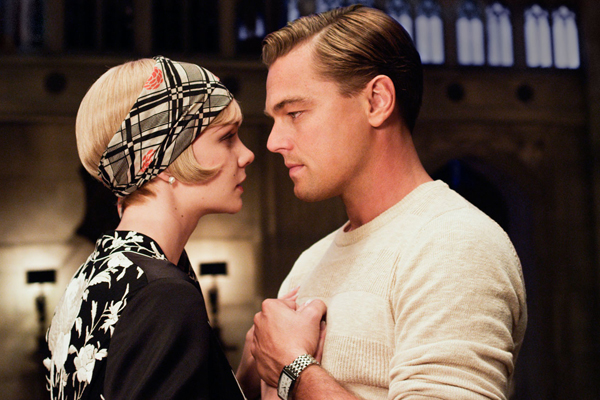
The Great Gatsby is actually the fifth time that the F. Scott Fitzgerald novel has been adapted as a motion picture (history of the other four later). Any conversation about “the Great American novel” must include Fitzgerald’s most successful tome, although many will offer other possibilities for that particular label.
Writer/director Baz Luhrmann brings his particular brand of spectacle and visual excess to this story that is almost mandatory reading for any American high school student. In case no one is familiar with the story, “Nick Carraway” (Maguire) has come to fictional West Egg, New York (a NYC location on Long Island) to become a bond trader on Wall Street in the pre-Wall Street crash 1920s. He moves into a small house next door to the enormous and well-appointed mansion of one “Jay Gatsby” (DiCaprio). Nick’s cousin “Daisy Buchannan” lives across the bay in East Egg with her husband “Tom” (Edgerton) who comes from old money.
Everything seems hunky-dory and Daisy wants to fix Nick up with her good friend, “Jordan Baker” (Debicki) an amateur golfer who is known for being a “fast” woman who is also somewhat loose with the truth. But there are layers and layers of secrets. Tom is having an affair with “Myrtle Wilson” (Fisher), the wife of the garage/gas station owner “George Wilson” (Clarke) and it turns out that Jay Gatsby bought this mansion because it had a view of his long-lost love, Daisy. He wants her back and he needs Nick’s help to arrange a meeting.

For the most part, the acting is superb. DiCaprio doesn’t channel the performance of Robert Redford, who portrayed Gatsby in 1974, but instead puts his own stamp on the character. While Luhrmann’s script may have over-used Gatsby’s catchphrase of “old sport” a few times too many, it doesn’t detract from the acting on display. Mulligan, who wowed us in 2009’s An Education, is perfectly cast in the role of Daisy, giving the audience both the vulnerability and ultimately fickle nature as Fitzgerald wrote the character. Toby Maguire is bland, but since Nick Carraway is supposed to be bland, he works well in the role. And Joel Edgerton is terrific as the blunt, crass Tom Buchannan.
What doesn’t work is that Luhrmann provides an interpretation rather than an adaptation of the novel. Parts of the story that are important are not to be seen and he adds things that were not in the final version of Fitzgerald’s work that was handed to his publisher. I read somewhere that Luhrmann had access to an earlier draft from Fitzgerald and maybe the changes came from that draft. I just know they didn’t work for me. Further, the “spectacle” that marks his films is a bit much here, detracting from the tenderness of the love stories that involve people married to people they would rather not be married to.
Personally, I prefer the 1974 version, and am not a fan of the 2000 made for TV version that was quite unremarkable in its presentation. The first film version of the story was actually released in 1926, only a year after the novel’s publication. It was a silent film and today the only trace of its existence that remains is a trailer for the movie at the National Archives. Another version was done in 1949, starring Alan Ladd and Shelley Winters, but it is presently almost impossible to view.
However, I can recommend this version, as the acting alone makes it worth seeing. Plus, if you like Luhrmann’s penchant for excess, you will enjoy his version of The Great Gatsby.
